Did you know that munchkin cats, with their cute short legs, could have a hard time with obesity? Their small size means they need more care to stay healthy. It’s key to keep them fit through diet and exercise. This way, they can live a long and energetic life.
It’s important to pay special attention to what munchkin cats eat and how much they move. A balanced diet and regular activity help prevent weight gain. This avoids serious health problems such as diabetes or heart issues. By knowing what to do, you can make sure your cat stays healthy and happy.
Key Takeaways
- A proactive approach to managing feline nutrition can help prevent munchkin cat obesity.
- Munchkin cats require a specific balance of diet and exercise to maintain optimal health.
- Understanding your munchkin cat’s mobility limitations is crucial in designing an effective weight management plan.
- Risk of health issues increases significantly with obesity, making weight management imperative.
- Implementing these strategies enhances your munchkin cat’s quality of life and longevity.
Understanding Munchkin Cat Obesity
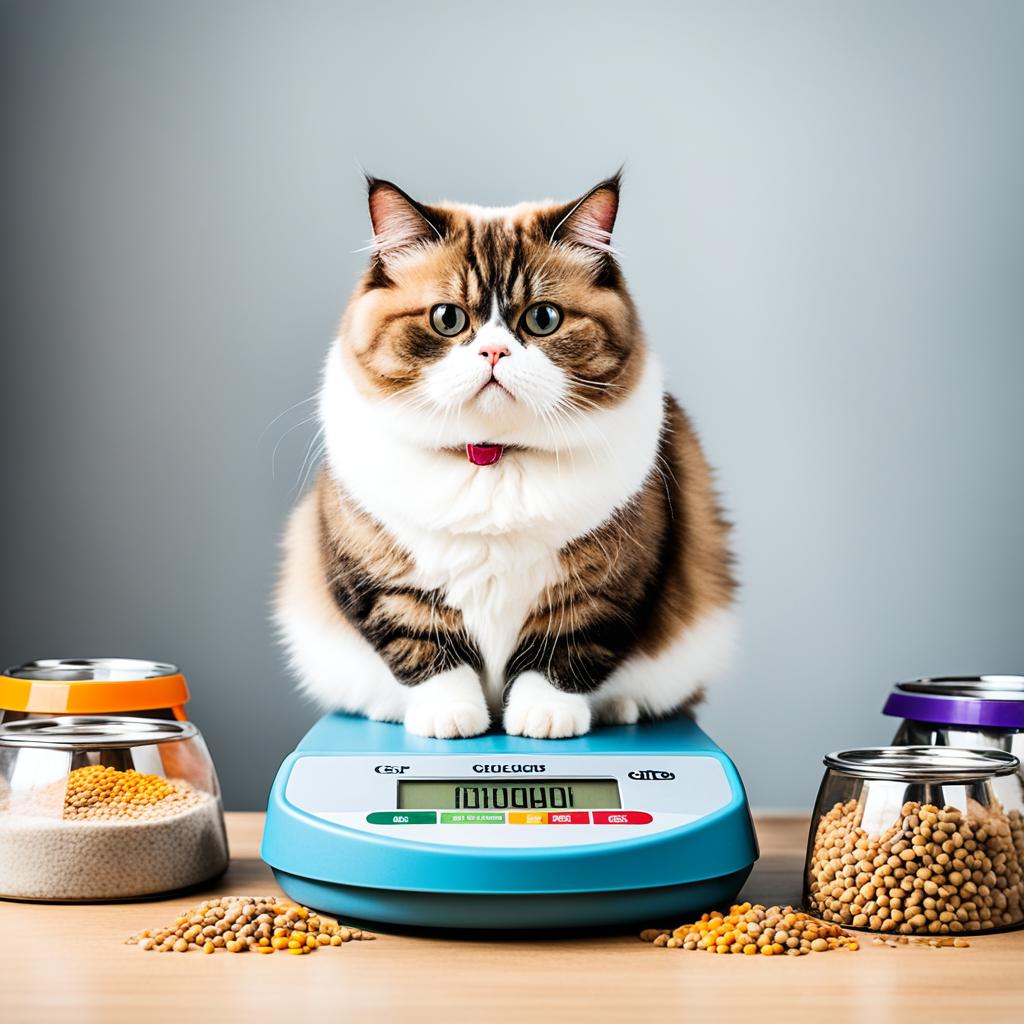
Obesity is a big health concern for Munchkin cats. Because of their short legs, they can gain weight easily. So, it’s vital to know how to maintain cat weight.
Understand the risks of feline obesity. It can lead to diabetes, heart issues, and trouble with joints. By managing your Munchkin’s weight, you also look out for its future health and joy.
Knowing is power. Learn about cat obesity and the reasons why Munchkin cats gain weight. You can then adjust your cat’s diet and exercise to keep it healthy.
| Health Risk | Impact |
|---|---|
| Diabetes | Increased insulin resistance leading to long-term health issues |
| Heart Conditions | Heightened risk of cardiovascular diseases |
| Joint Problems | Mobility issues related to excess weight and stress on joints |
Munchkin cats face a higher risk of weight problems due to genetics. It’s key to keep an eye on their health. This way, they can lead a fit, happy life.
How to Prevent Munchkin Cat Obesity?
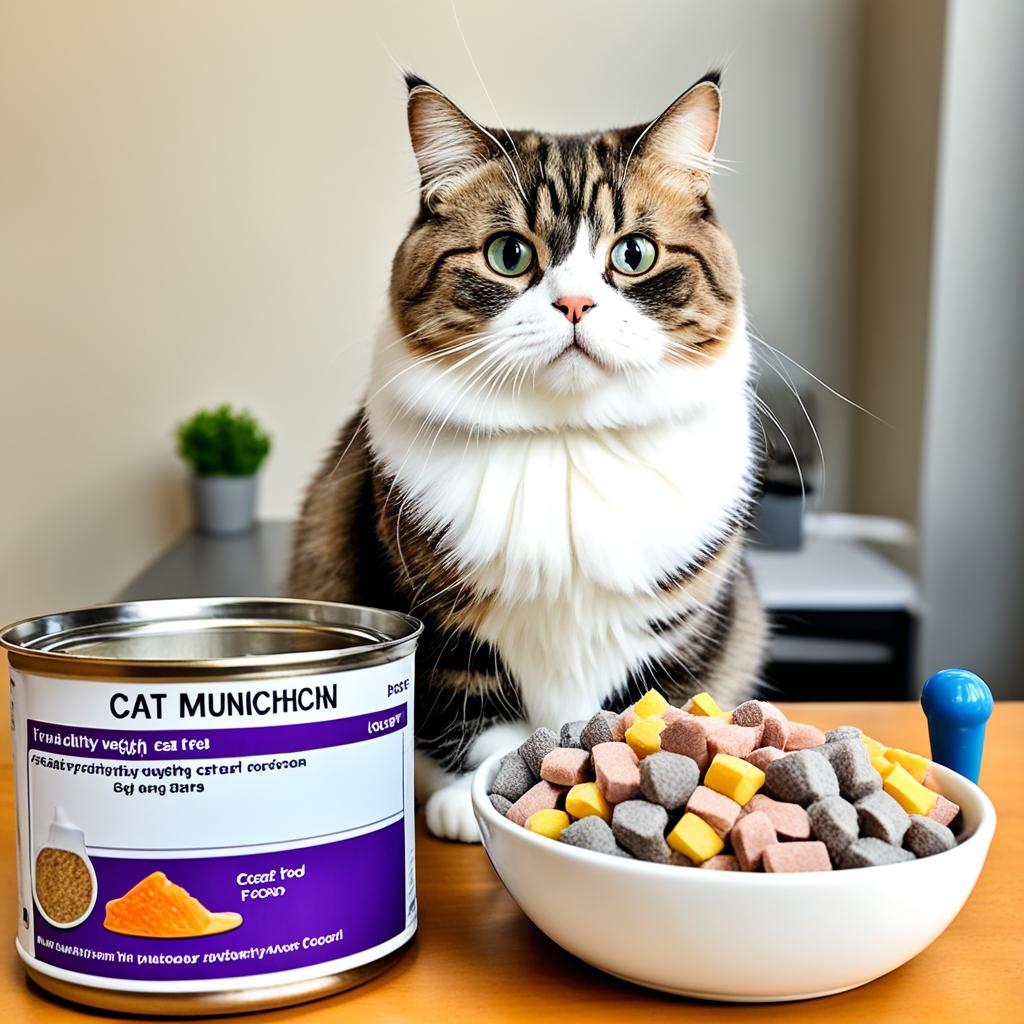
Keeping your munchkin cat at a healthy weight is vital for their well-being. We’ll look at important steps to keep your munchkin in top shape.
Importance of Regular Veterinary Check-ups
Scheduling regular cat check-ups with a vet is key. These visits cover health assessments, vaccinations, and early issue spotting. At these times, your cat’s weight can be watched, which is crucial in avoiding obesity. This allows the vet to make personalized diet and exercise plans.
Monitoring Your Munchkin’s Weight
It’s also important to keep an eye on your cat’s weight at home. Tracking weight is a great way to make sure your cat stays healthy. Here’s how you can do it:
- Weigh your munchkin often with a pet scale.
- Keep a record and look for any big changes.
- Use treats to boost activity and keep an eye on how much your cat eats.
Use this table that shows the right weight for your munchkin at different ages:
| Age | Weight Range (lbs) |
|---|---|
| 1-6 Months | 2-5 lbs |
| 6 Months – 1 Year | 5-8 lbs |
| 1-2 Years | 6-9 lbs |
| 2+ Years | 7-10 lbs |
Follow these steps, including regular vet visits and at-home weight checks. With this, you can make sure your munchkin is happy and healthy for a long time.
Munchkin Cat Diet Tips
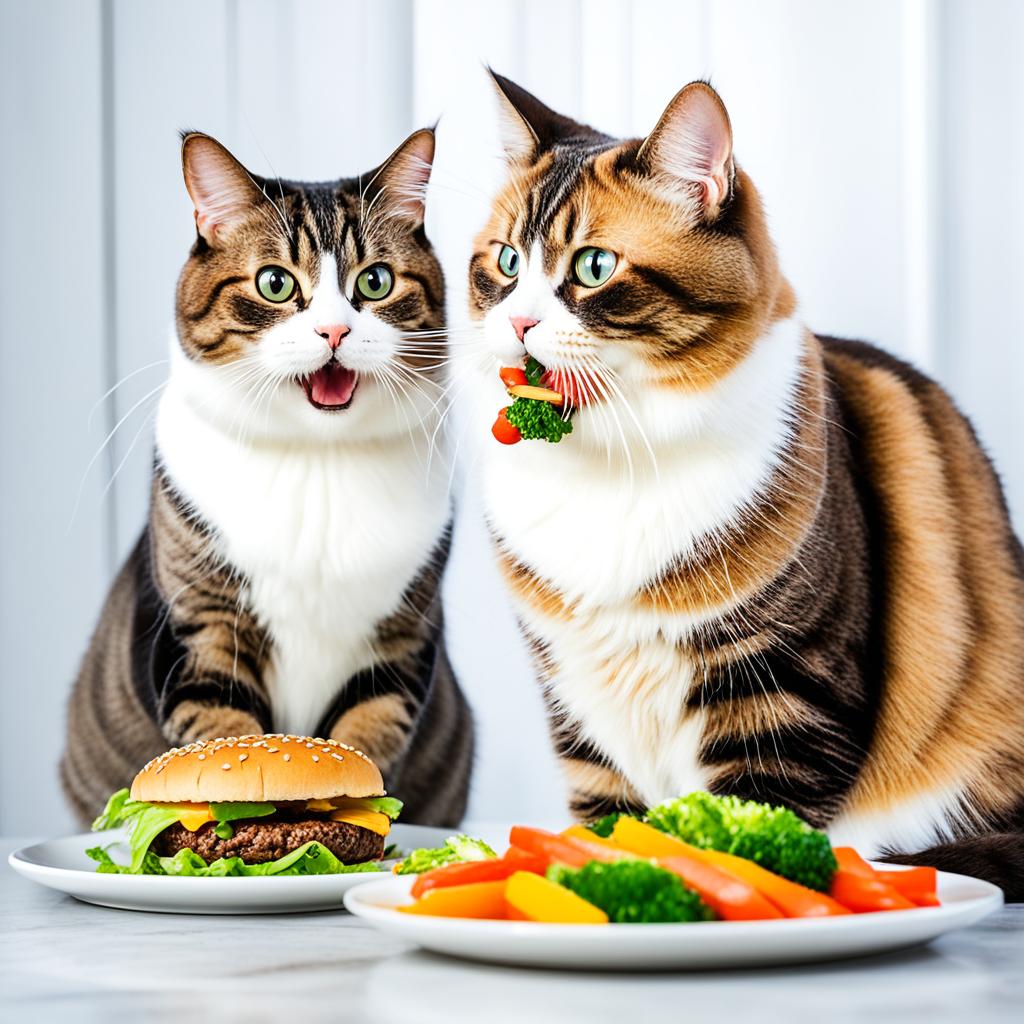
Keeping Munchkin cats healthy and avoiding obesity means giving them a balanced diet. This diet includes the right amount of protein, fats, and carbs. It meets their special needs for calories.
Balanced Diet for Munchkin Cats
A balanced feline diet is key for Munchkin cats. It uses high-quality proteins, not too much fat, and controlled carbs. Pet owners should look for choosing cat food with lots of animal proteins and little grain. It’s also important to watch how much your cat eats to avoid overeating.
Wet vs. Dry Cat Food: Pros and Cons
The discussion of wet vs. dry cat food is very important for Munchkin cats. Wet food keeps your cat hydrated and helps their kidneys. Dry food can be good for their teeth by lessening plaque build-up.
| Wet Cat Food | Dry Cat Food |
|---|---|
| Provides Hydration | Supports Dental Health |
| Typically Higher Protein | More Convenient for Storage |
| Shorter Shelf Life Once Opened | May Contain More Fillers |
To find the right food for your Munchkin, it’s best to talk to a vet. They can recommend a diet balanced feline diet just for your cat. Knowing the good and bad of both wet and dry food helps ensure your Munchkin has good hydration and teeth care.
Exercise Routine for Munchkin Cats
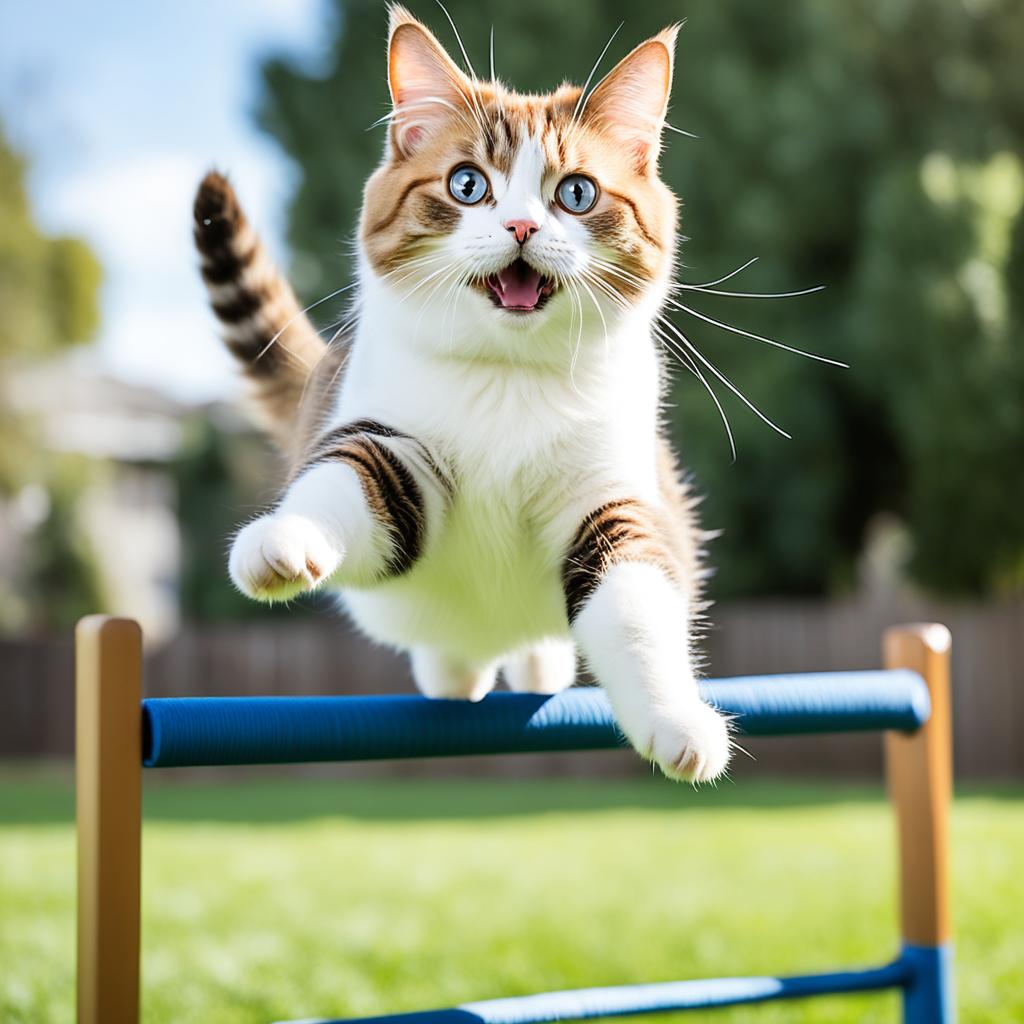
Creating a good Munchkin Cat Exercise Routine means picking activities that fit their body. Because they have shorter legs, we need to avoid exercises that strain them while still keeping them moving.
Interactive play for munchkins can really make a difference. Use toys that make them chase, bat, and jump like wand toys and laser pointers. These interactive activities are fun, help with weight control, and keep your cat’s mind sharp.
Building climbing structures is also a plus for Indoor Cat Fitness. Make sure to add shorter climbing areas to your cat trees for their small legs. This lets them work out in a full-body way and explore their space safely.
Tossing puzzle feeders into the mix at meal times is a big help. They make your munchkin move and use their brain, which is key to their exercise plan.
| Activity | Description | Benefits |
|---|---|---|
| Interactive Play | Wand toys, laser pointers | Keeps them active, mental stimulation |
| Climbing Structures | Low-level cat trees | Physical exercise, exploration |
| Puzzle Feeders | Food-dispensing toys | Promotes movement, mental engagement |
Combining these activities in your Munchkin Cat Exercise Routine keeps your cat lively, healthy, and delighted. So, start the fun and see your munchkin cat do great!
Grooming and Its Role in Health
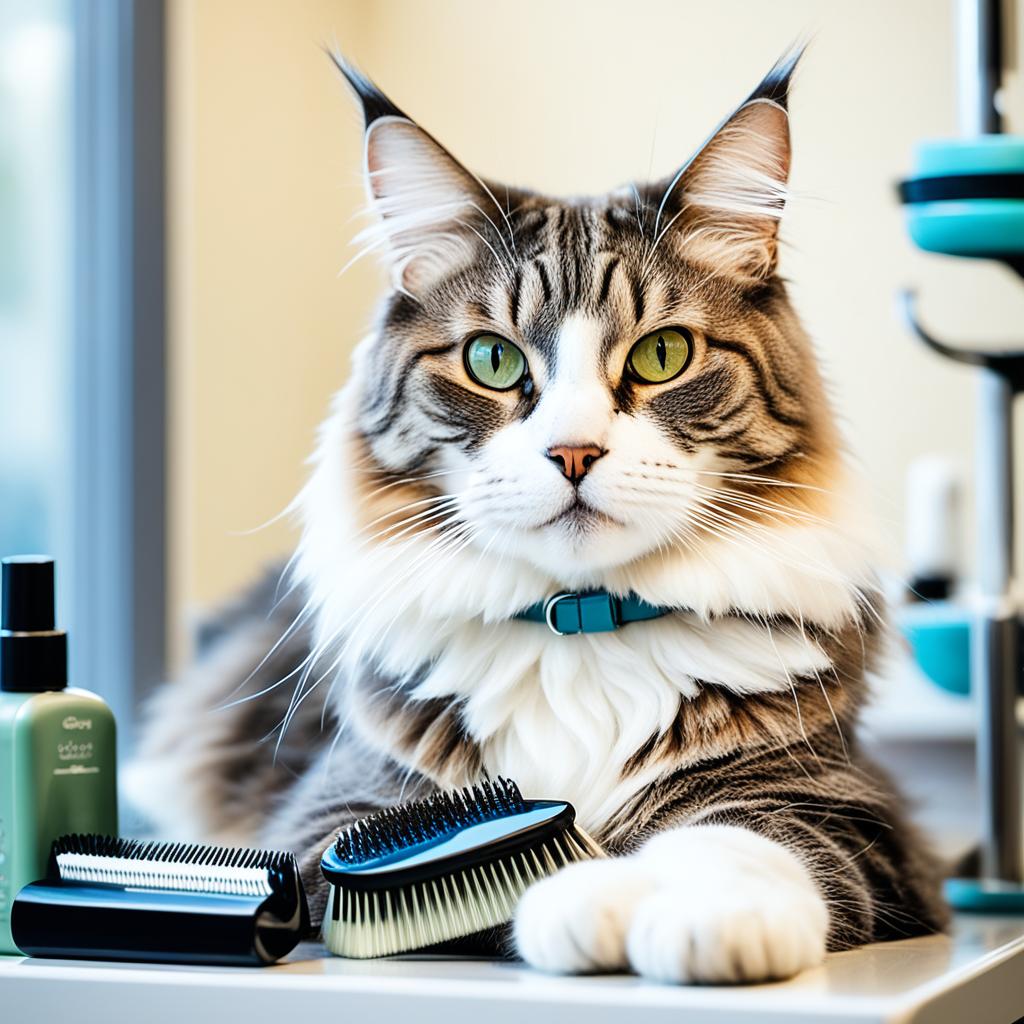
Grooming is key for your munchkin cat’s health. Aside from diet and exercise, it’s crucial. Munchkin cats with their short legs often need help with their coats. Grooming helps with shedding, mats, and keeps them at a good weight.
Regular grooming lets you watch your cat’s body closely. It’s great for checking if they’re gaining a little weight. Catching this early can stop health problems before they start.
Grooming isn’t just about looks. It’s vital for your cat’s health. Clipping nails, cleaning ears, and looking after teeth makes them feel and look good. Plus, grooming helps you keep track of their weight.
So, pick up that brush and start grooming. It makes sure your munchkin is healthy, happy, and has less hairball trouble. Plus, you’ll get to enjoy more cat snuggles.
Recognizing Early Signs of Obesity
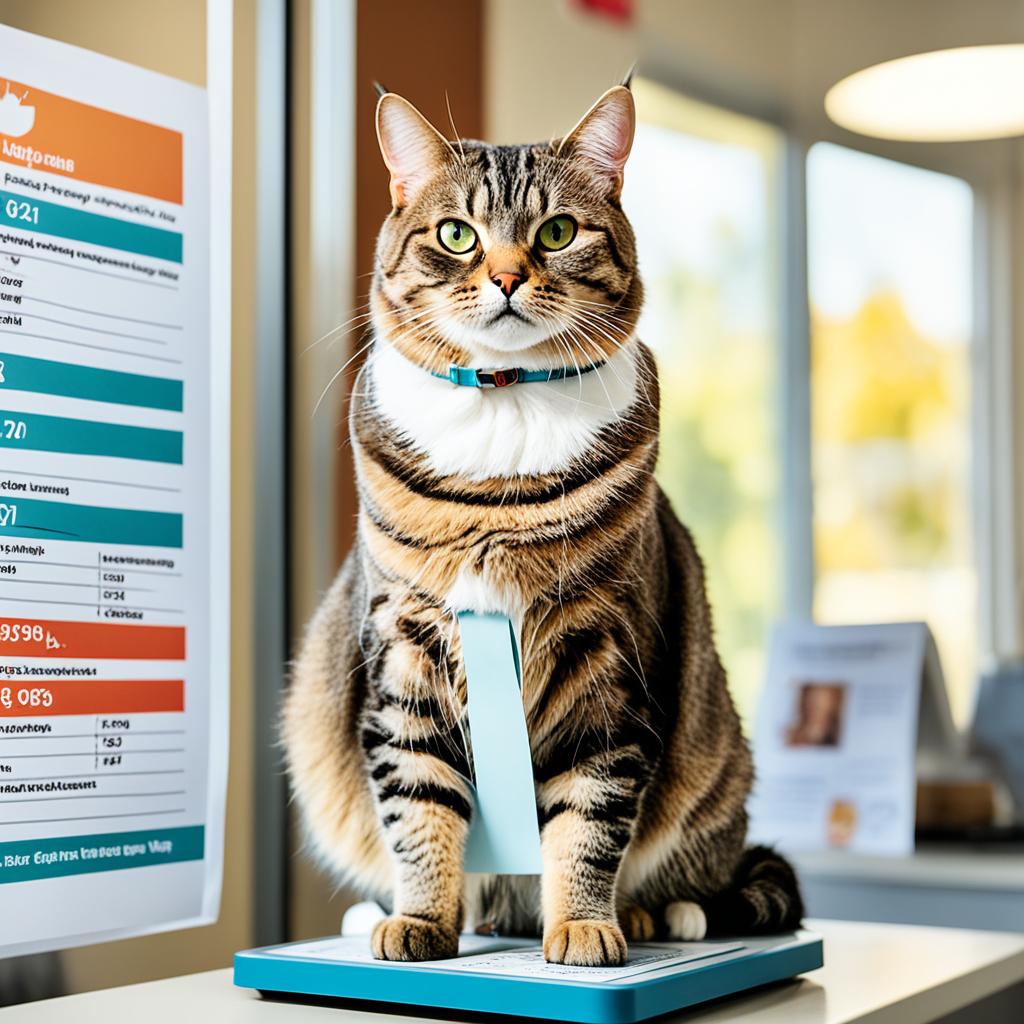
Spotting obesity early in your munchkin cat is key. This allows for quick action. I’ll show you the main signs to watch for.
Behavioral Changes
Behavioral indicators of weight issues are often easy to spot. One is a drop in how much your cat moves. If your cat used to love running and jumping but now just lounges, it could be a sign. This could mean your cat is finding it hard to move due to extra weight. Playing often with your cat is a great way to fight these issues. It helps keep your cat active and healthy.
Physical Symptoms to Watch Out For
Look for physical signs too, like trouble grooming and a bigger body. Detecting cat obesity means keeping an eye on changes in your cat’s size. If you see your munchkin cat not reaching parts it used to, it might be due to weight. Also, noticing its shape becoming round is a red flag. Seeing your vet early helps ensure your cat’s well-being.
| Indicator | Description |
|---|---|
| Reduced Activity | Less engagement in play and interaction |
| Difficulty Grooming | Struggling to reach all areas of their body |
| Body Expansion | Visible rounding and weight gain |
By watching closely for these behavioral indicators of weight issues, you can act fast. This is important for your cat’s health and happiness.
Reducing Stress in Munchkin Cats
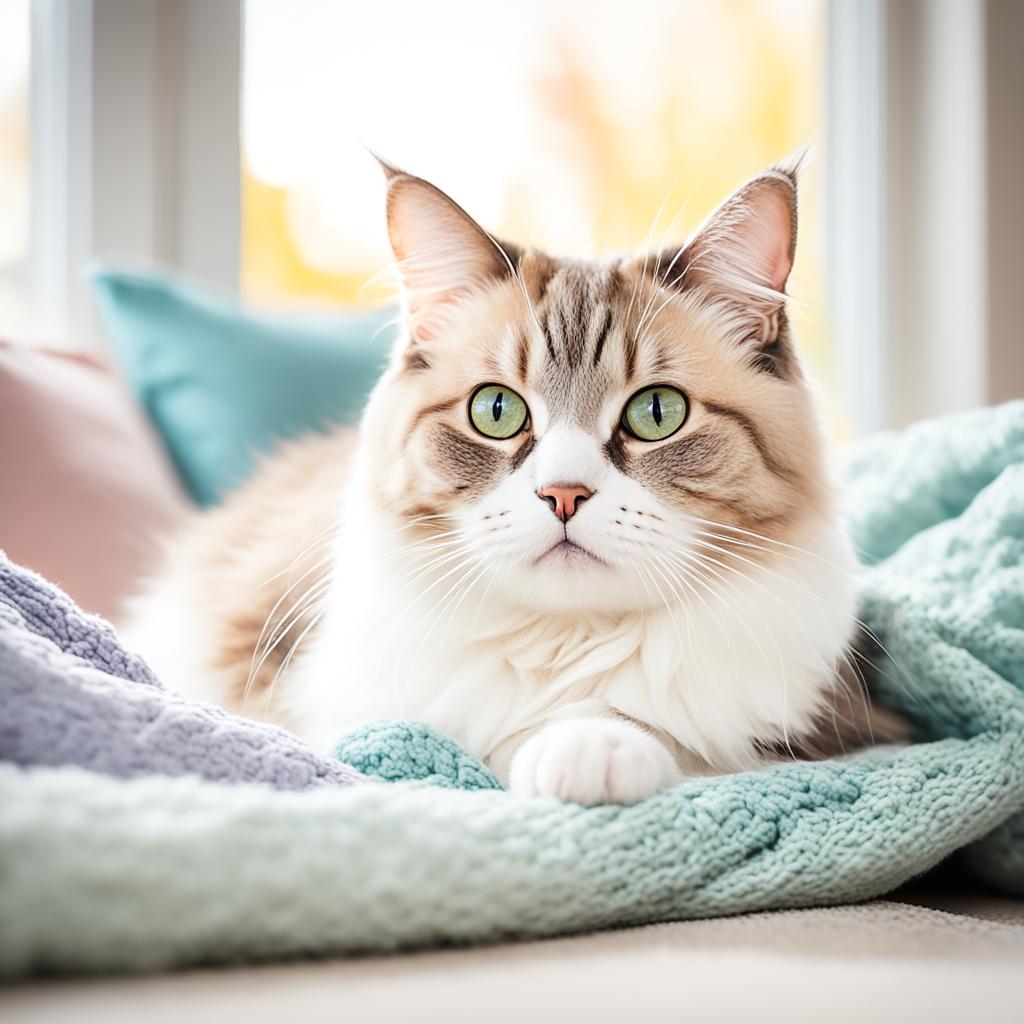
Making a happy home for your munchkin cat is key to their happiness. We will look at strategies to make your home calm and fun for them.
Creating a Safe and Stimulating Environment
To lower your cat’s stress, creating a safe space is vital. This area should include quiet places to sleep and activities they love. A safe environment reduces anxiety and makes your cat happy.
Interactive Toys and Playtime
Playing with your cat is a great way to keep them active and mentally sharp. Use toys like laser pointers and puzzle feeders. Playtime not only keeps them healthy but also makes them less stressed.
Training and Socialization Techniques
Teaching your cat to be around people and pets is important. Early training can make them less afraid and more friendly. Using positive lessons helps keep them joyful and stress-free.
Importance of Patience and Consistency
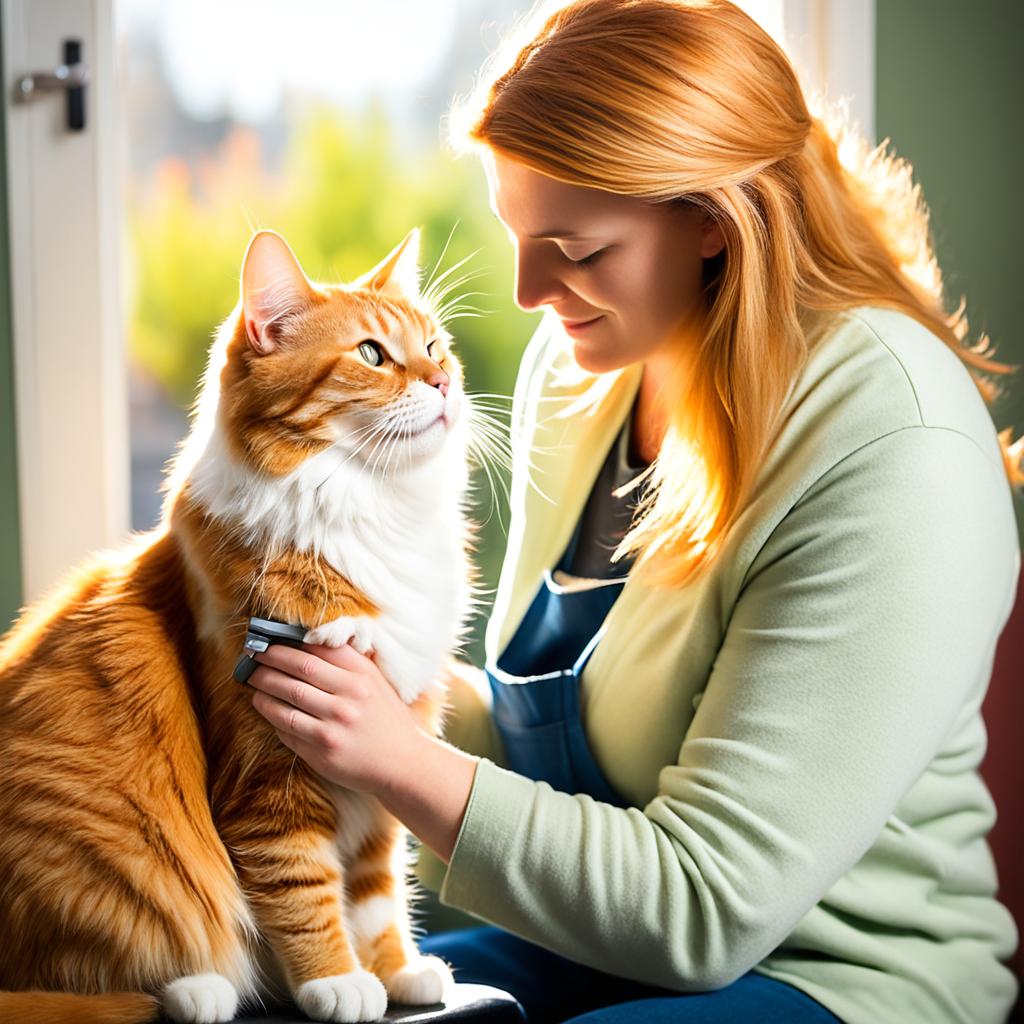
Looking out for your munchkin cat demands patient and constant attention. Patience and consistency are key. It’s best to introduce changes like new food or exercise slowly. Munchkin cats take their time to learn new things, especially with their short legs. This approach prevents accidents.
Being consistent is crucial for keeping your cat at a healthy weight. A steady routine helps your cat feel safe and reduces stress. Stick to the same times for feeding or play. This way, things flow better and your cat stays in better shape.
“Patience is not the ability to wait but the ability to keep a good attitude while waiting.” – Joyce Meyer
Joyce Meyer had it right. Keeping a positive mindset as you change your cat’s habits really helps. Slowly change their diet and add new activities. This makes for a smoother, healthier life for your feline friend.
- Gradual Diet Changes: Switch food slowly to avoid tummy troubles.
- Consistent Exercise: Have daily fun, active play times based on their abilities.
- Routine Vet Visits: Go to the vet often for health updates.
Always remember, your cat’s health journey is long. It’s not about hurrying to get results. Being patient and consistent sets the path for a happy and healthy cat.
Common Health Problems Linked to Obesity
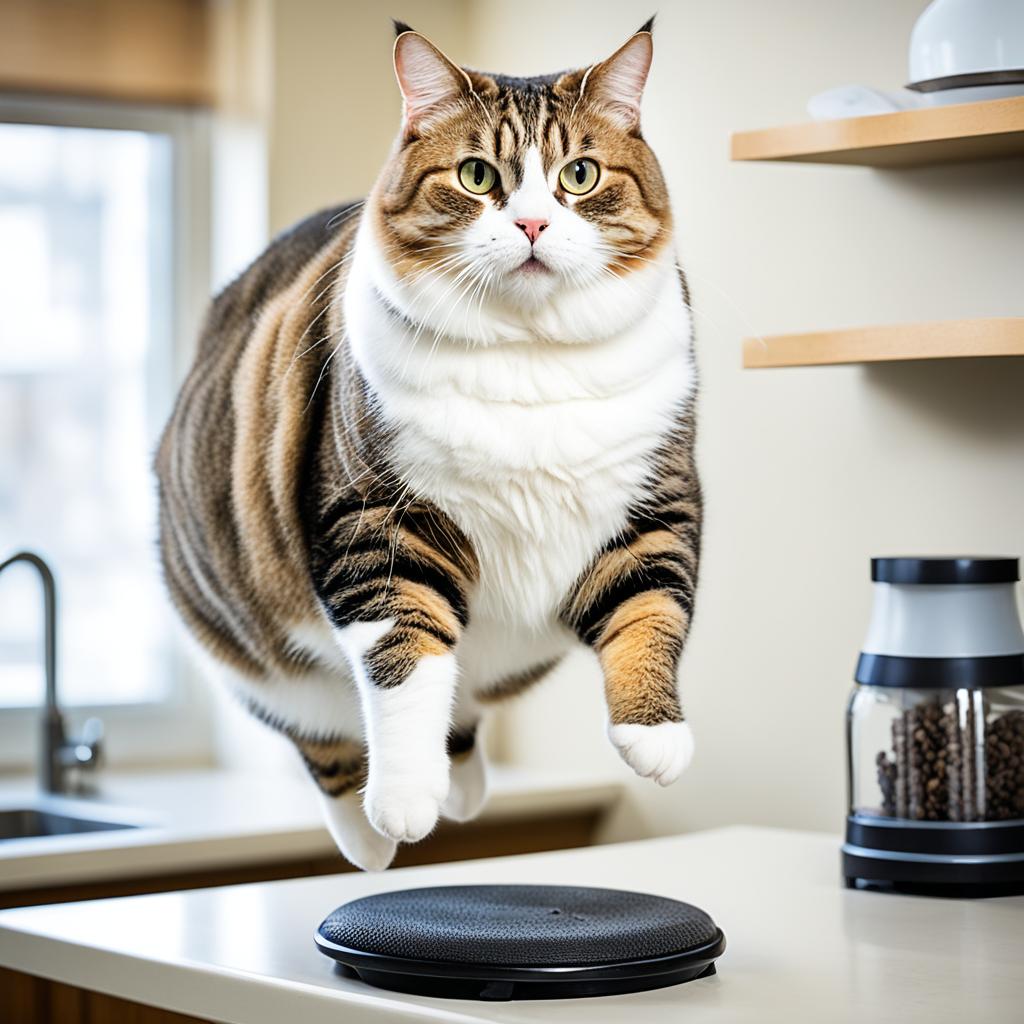
Obesity in munchkin cats is serious. It leads to various health problems. These include joint issues and metabolic disorders. Now, let’s talk about what happens when cats carry too much weight.
Osteoarthritis in Munchkin Cats
Munchkin cats have short legs, which can get painful from too much weight. This leads to osteoarthritis. Keep your cat at a healthy weight to avoid this.
Obesity can make daily life very tough for munchkins. It makes it hard for them to move comfortably. Remember, regular check-ups and managing their weight are crucial for preventing osteoarthritis.
Heart Conditions
Extra weight is hard on the heart. Cat obesity often leads to heart issues. Taking care of your cat’s weight with a good diet and exercise reduces this risk. A happy cat has a healthy heart.
Diabetes in Felines
Now, feline diabetes. Obesity increases the chance of diabetes in cats. It’s a serious health issue. Managing your cat’s weight and checking their blood sugar are crucial steps.
Eating healthy helps manage diabetes. It ensures your munchkin can still have a great life.
Obesity is the start of many health issues. Early recognition and action are key. They help your cat live a happy, healthy life.
Conclusion
Your munchkin cat’s health is in your hands. Obesity is a big worry, so stay alert. Focus on a balanced diet suited to your cat. This sets up a healthy future. Regular activities are just as important. They keep your cat fit and happy.
Regular vet trips are a must. These visits help watch your cat’s weight closely. Early checks keep obesity-related health issues at bay. This includes problems like joint pain and diabetes.
Stay patient and keep to a schedule. Slow and steady steps in diet and exercise are key. They don’t just help your cat but also keep you sane. Care for your munchkin with all your heart. You’ll see the effort is truly rewarding. Stick to these tips. They will guide you and your cat towards a healthy life.
FAQ
How do I prevent my munchkin cat from becoming obese?
To keep your munchkin cat healthy, make sure it eats the right food and stays active. Use high-protein, low-carb food. Play with your cat using interactive toys. Also, provide things for them to climb on.
What are the best diet tips for munchkin cats to avoid obesity?
It’s important to give your munchkin cat a mix of proteins, fats, and carbs. Be careful with how much food you give them. Ask your vet if wet or dry food is better, based on your cat’s needs.
How important are regular veterinary check-ups for my munchkin cat?
Vet check-ups are crucial for keeping your munchkin cat healthy. This helps your vet watch your cat’s weight and catch any issues early. They’ll give you advice on the best food and exercise for your cat.
What kind of exercise routine should my munchkin cat have?
Getting enough exercise is key to preventing obesity in your cat. Use toys, climbing areas, and feeders that make your cat move. Regular, fun playtimes are also a must.
How can grooming help manage my munchkin cat’s weight?
Grooming your cat regularly isn’t just about looking good. It helps you notice if your cat is gaining too much weight. Regular grooming also includes checking their nails and ears for overall health.
What are the early signs of obesity in munchkin cats?
Look out for changes in how active your cat is. You might see they’re not as playful. Signs like not grooming well and getting rounder are clues your cat may be gaining weight. If you think they are, see your vet right away.
How can I reduce stress in my munchkin cat to help manage weight?
Keep your cat’s environment interesting and fun with toys and play. Socializing with people and other pets can help, too. Training and stress-relief techniques can help keep your cat calm and at a good weight.
Why is patience and consistency important in weight management for munchkin cats?
Being patient and sticking to a plan is key in helping your cat get used to new eating and exercise habits. Slow changes prevent injuries and help keep your cat’s legs healthy.
What health problems are linked to obesity in munchkin cats?
Obesity in cats can lead to serious health issues like joint pain, heart problems, and diabetes. Working with your vet to watch your cat’s weight can prevent or lessen these risks.




